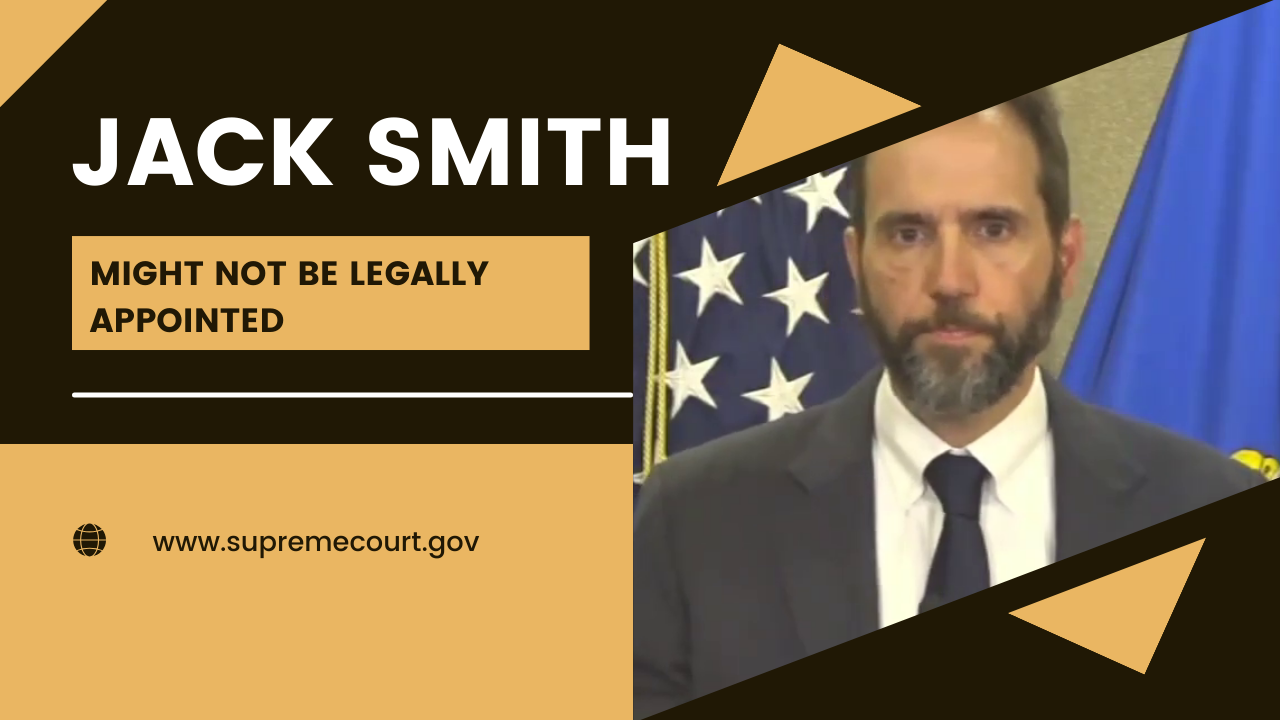Constitution
Jack Smith appointment questioned
Special Counsel Jack Smith might not have been legally appointed, because the Attorney General’s authority might not be sufficient.

Special Counsel Jack Smith might not have been properly appointed to his office, according to recent Supreme Court filings. In addition, The Gateway Pundit claims evidence questioning whether Smith filed certain briefs, motions, etc. under his legal name.
Jack Smith loses – and questions arise
Earlier this month, attorneys for President Donald J. Trump filed an appeal in the “January 6 case” against him. Their brief held that President Trump is legally immune from prosecution for his every act while President. This would track with the theory of the National Constitutional Law Union, that Presidents are not subject to prosecution in courts of law. The correct sanction against a President, for Presidential acts, is impeachment, not a criminal or civil trial.
Immediately Jack Smith filed an emergency petition for review by the Supreme Court. He indicated that the Court must act swiftly – even before the Court of Appeals for the District of Columbia acted.
The Supreme Court set a tight deadline for Trump and his team to respond to the petition. Trump did respond, urging the Court to deny review. But furthermore, nineteen State Attorneys General – with Alabama in the lead – filed a friend-of-the-court brief saying the same.
Jack Smith did file a reply to the response brief. Julie Kelly, who has severely criticized Smith and all his proceedings, said Smith came close to admitting that the Biden Administration wanted a conviction by Election Day.
The next day (Friday, December 22), the Court tersely denied review before judgment.
Further details
Rumors have the Court deciding 9-0 to deny review. CNAV cannot verify that independently. The rules of the Court require four judges to agree to review any case. The Order List shows that the Court denied the petition. It did not say who, if any, would have granted it.
In the meantime, Judge Tanya Chutkan of the U.S. District Court for the District of Columbia District has stayed all proceedings pending resolution of any and all appeals. The Court of Appeals for the District of Columbia has scheduled oral argument in the matter on January 9, 2024.
But those nineteen Attorneys General were not the only ones filing a friend-of-the-court brief. Former Attorney General Edwin Meese and Professors Steven G. Calabresi and Gary S. Lawson filed their own. According to them, Jack Smith was improperly appointed. Specifically, the statute under which Attorney General Merrick Garland appointed him, does not suffice to “vest” that appointment in the Attorney General alone. Indeed no statute exists authorizing any Office of Special Counsel.
Article II Section 2 of the Constitution of the United States reads in relevant part:
[The President] shall nominate, and by and with the Advice and Consent of the Senate, shall appoint Ambassadors, other public Ministers and Consuls, Judges of the supreme Court, and all other Officers of the United States, whose Appointments are not herein otherwise provided for, and which shall be established by Law: but the Congress may by Law vest the Appointment of such inferior Officers, as they think proper, in the President alone, in the Courts of Law, or in the Heads of Departments.
Congress has made no “establishment” of the office, nor “vested the appointment” of a special counsel in the Attorney General alone, according to the Meese brief.
A defective affidavit
The issue might be moot now, because the Supreme Court has denied review, as the two briefs urged. But his morning The Gateway Pundit asserted it now had evidence that Smith did not even complete the appointment process. Jim Hoft reports an anonymous tip pointing out that Smith failed to satisfy this requirement (5 U.S. Code § 3332):
An officer, within 30 days after the effective date of his appointment, shall file with the oath of office required by section 3331 of [Title 5, United States Code] an affidavit that neither he nor anyone acting in his behalf has given, transferred, promised, or paid any consideration for or in the expectation or hope of receiving assistance in securing the appointment.
Jack Smith allegedly filed an affidavit on November 20, 2022 – but it was missing a witness signature. Smith submitted a corrected affidavit on September 14, 2023. That’s 298 days after the appointment. According to Section 3332, that’s 268 days too late.
Smith might have another problem. He received his appointment under the name John Loman Smith – then issued a grand jury presentment on June 8, 2023, under the name Jack Smith. In other words, he used two different names to refer to himself. This discrepancy might or might not be significant, according to The Gateway Pundit’s consulted legal expert. But failure to take an oath of office on time, definitely is significant and could invalidate his every act.
Terry A. Hurlbut has been a student of politics, philosophy, and science for more than 35 years. He is a graduate of Yale College and has served as a physician-level laboratory administrator in a 250-bed community hospital. He also is a serious student of the Bible, is conversant in its two primary original languages, and has followed the creation-science movement closely since 1993.
-

 Executive4 days ago
Executive4 days agoSecret Service chief gets no solace
-

 Executive3 days ago
Executive3 days agoWaste of the Day: Louisville Taxpayers Pay Nearly $600,000 For Empty Building’s Maintenance, Security
-

 Guest Columns4 days ago
Guest Columns4 days agoFear Itself: Democrats’ Favorite Strategy Caused Their Current Chaos
-

 Executive3 days ago
Executive3 days agoWhere is Joe Biden – or Jill?
-

 Executive1 day ago
Executive1 day agoWaste of the Day: Throwback Thursday: Cities Used Crime Prevention Funds on Soccer Games, Paper Shredding
-

 Executive2 days ago
Executive2 days agoFacile and politically motivated suggestions
-

 Civilization4 days ago
Civilization4 days agoBuild Iron Dome in the United States To Prepare for Israel’s Worst Day
-

 Executive4 days ago
Executive4 days agoThe Emerging GOP Plan To Beat Kamala Harris














